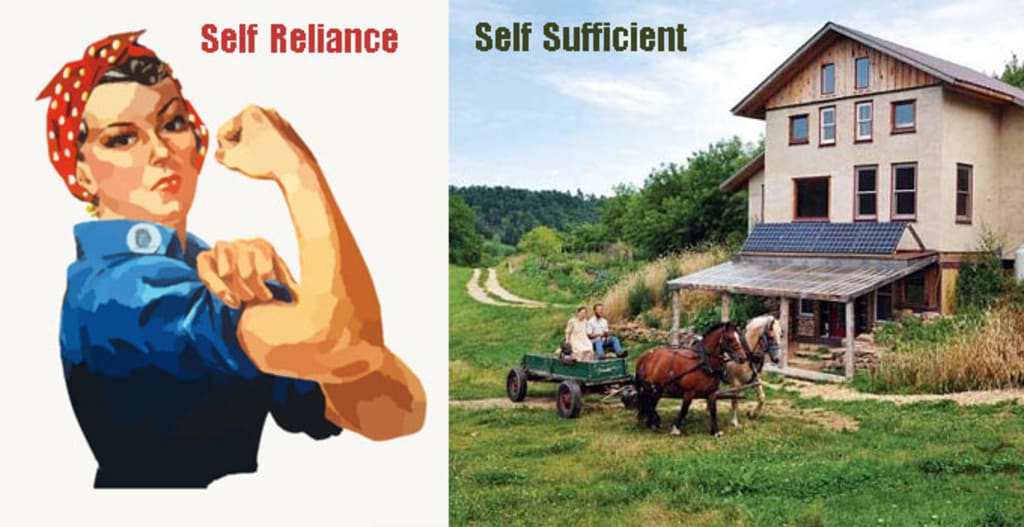"The Power of Self-Sufficiency and Self-Reliance: Achieving Independence and Resilience"
Self Sufficiency and Self Reliance

Self-sufficiency refers to the state of being able to provide for oneself without relying on external resources or assistance. This can include being able to grow one's own food, generate one's own energy, and make one's own clothing and other goods. In this article, we will explore the benefits and challenges of self-sufficiency, as well as strategies for achieving it.
The benefits of self-sufficiency
Self-sufficiency can have many benefits, both for individuals and for communities. One of the biggest benefits is increased independence and self-reliance. When you are able to provide for yourself, you are not dependent on others for your basic needs, which can give you a sense of security and empowerment.
Another benefit of self-sufficiency is increased resilience. When you are able to grow your own food, generate your own energy, and make your own goods, you are less vulnerable to disruptions in the supply chain, such as natural disasters or economic downturns. This can help you to weather difficult times and bounce back more quickly.
Self-sufficiency can also have environmental benefits. For example, growing your own food can reduce your carbon footprint by reducing the need for transportation of goods. Generating your own energy can also reduce your dependence on fossil fuels and help to reduce greenhouse gas emissions.
The challenges of self-sufficiency
While self-sufficiency can have many benefits, it also comes with its own set of challenges. One of the biggest challenges is the time and effort required to become self-sufficient. Growing your own food, generating your own energy, and making your own goods all require a significant investment of time and energy.
Another challenge is the cost of getting started. Equipment, tools, and supplies can be expensive, and this can be a barrier for some people. Additionally, some people may not have the space or resources to grow food or generate energy.
Another issue with self-sufficiency is that it can be difficult to achieve alone. Many people find that they need to rely on a community of like-minded individuals to share resources, knowledge, and support. This can be hard to find in some areas or cultures.
Strategies for achieving self-sufficiency
Despite the challenges, there are many strategies that can help you to achieve self-sufficiency. One strategy is to start small and build gradually. Instead of trying to do everything at once, focus on one area, such as growing a vegetable garden, and then expand from there.
Another strategy is to find a community of like-minded individuals. Joining a gardening club, a co-op, or an online community can provide you with the resources, knowledge, and support you need to achieve self-sufficiency.
Another strategy is to be resourceful and innovative. Instead of buying expensive equipment and tools, try to find ways to make your own or repurpose existing materials. Additionally, research and learn about alternative, sustainable methods of growing food, generating energy, and making goods.
Conclusion
Self-sufficiency can be a powerful tool for increasing independence, resilience, and environmental sustainability. However, achieving self-sufficiency is not without its challenges. By starting small, building gradually, finding a community, and being resourceful, anyone can work towards self-sufficiency and a more sustainable future.
Self Reliance
Self-reliance refers to the ability to rely on oneself to meet one's own needs and make one's own decisions. This can include being able to provide for oneself financially, emotionally, and physically. In this article, we will explore the benefits and challenges of self-reliance, as well as strategies for achieving it.
The benefits of self-reliance
Self-reliance can have many benefits, both for individuals and for society as a whole. One of the biggest benefits is increased independence. When you are able to rely on yourself, you are not dependent on others for your basic needs, which can give you a sense of security and empowerment.
Another benefit of self-reliance is the ability to make one's own decisions. When you are able to provide for yourself, you are not dependent on others for financial support, which can give you the freedom to make your own choices about how to live your life.
Self-reliance can also lead to increased self-esteem and self-worth. When you are able to meet your own needs, you are less likely to feel helpless or powerless, which can help to boost your self-confidence and sense of self-worth.
The challenges of self-reliance
While self-reliance can have many benefits, it also comes with its own set of challenges. One of the biggest challenges is the time and effort required to become self-reliant. Building financial independence, emotional stability, and physical self-sufficiency all require a significant investment of time and energy.
Another challenge is that self-reliance can be difficult to achieve alone. Many people find that they need to rely on a community of like-minded individuals to share resources, knowledge, and support. This can be hard to find in some areas or cultures.
Another issue with self-reliance is that it can be a hard and long journey. It takes time, patience and a lot of effort to be truly self-reliant. It can be easy to get discouraged and give up along the way.
Strategies for achieving self-reliance
Despite the challenges, there are many strategies that can help you to achieve self-reliance. One strategy is to set specific, measurable goals for yourself. This can help you to focus your efforts and stay motivated.
Another strategy is to find a community of like-minded individuals. Joining a support group, a co-op, or an online community can provide you with the resources, knowledge, and support you need to achieve self-reliance.
Another strategy is to be resourceful and innovative. Instead of relying on others for help, try to find ways to solve problems on your own. Additionally, research and learn about different self-reliance methods and techniques such as budgeting, emergency planning, and self-care.
Final Words
Self-reliance is an important aspect of personal development and a key component of achieving a sense of independence and self-worth. But it's not an easy journey, and it takes a lot of hard work, patience, and determination. By setting specific goals, finding a supportive community, and being resourceful, anyone can work towards self-reliance and a more fulfilling life.






Comments
There are no comments for this story
Be the first to respond and start the conversation.